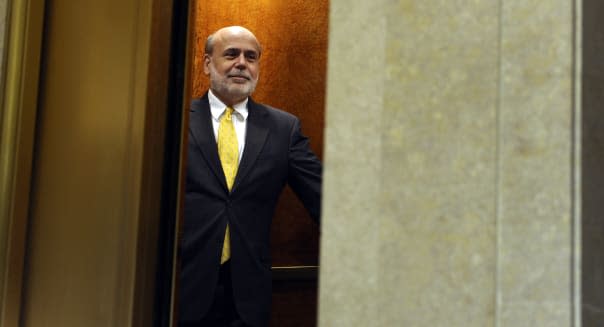Rich Americans Bid Ben Bernanke a Tearful Goodbye

After eight years in office, Federal Reserve Chairman Ben Bernanke has left the building.
Over the past eight years, Bernanke has overseen a topsy-turvy economy. It's an economy that saw General Motors (GM) threaten to declare bankruptcy if it didn't get a government loan ... then it got that loan, went bankrupt anyway and eventually returned to health. It's an economy in which dozens of banks went bust during the financial crisis, while scores more survived -- saved by a "quantitative easing" program that's sunk interest rates to historically low levels, while simultaneously quadrupling the size of the Fed's balance sheet.
Fast-forward to Jan. 31 -- the last workday for "Helicopter Ben," so nicknamed for his half-joking 2002 threat to print dollars and drop them into the economy by helicopter, if that's what it took to fight deflation.
Many Americans will hate to see him go -- none more so than the nation's wealthiest citizens.
Polling the Masses
In honor of his departure, the Gallup research organization conducted a poll asking Americans what opinion they have of Chairman Bernanke. What Gallup found is that while he didn't exactly escape the financial crisis unscathed, a plurality of Americans (40 percent) nonetheless approve of the job he did.
A plurality rather than a majority? That's not exactly a ringing endorsement. But one subgroup of Americans is much more enthusiastic in its appreciation of what Helicopter Ben did for them: the rich.
Breaking down its polling data by annual household income, %VIRTUAL-article-sponsoredlinks%Gallup found that at most income levels, Americans split evenly in their opinions of Bernanke. What differences there are between those who "approve" or "disapprove" of his performance fall within the poll's plus-or-minus 4 percent margin of error. This holds true for groups with household income of anywhere from $0 to $90,000.
In contrast, the one stratum of society that unabashedly approved of the chairman's handling of the economy -- the eased lending standards, the bailouts, and of course the creation of $85 billion a month in new money dropped from the air -- was Americans with incomes of $90,000 and up.
Why is this? Aside from the likelihood that folks earning $90,000 and up are probably pretty happy with life in general and inclined to approve of how things are going -- is there any reason in particular that they should be particularly fond of Ben Bernanke?
Actually, there is. If you recall, the first two years of Bernanke's term of office saw the Dow Jones industrial average (^DJI) post double-digit gains -- up 30 percent in total to a high north of 14,000 before the financial crisis struck. The market suffered a bit (ahem) of a hiccup during the crisis, of course. But thanks to the Fed's infusion of cash in 2009 and thereafter -- and the accompanying low interest rates that turned savings accounts into a losing proposition -- the stock market has come roaring back. It's more than doubled off its lows to reach 15,848, returning an average of about 19 percent profits annually since March 2009.
Well, Of Course!
According to The New York Times, only about half of American households own stocks -- whether through stakes in mutual funds and pension funds, or through direct ownership. Households in the top 10 percent earnings bracket (which the IRS puts at $114,000 and up, and so within the highest strata of earners polled by Gallup) own 90 percent of this stock. They are thus disproportionately likely to have benefited from Ben Bernanke's reign.
If you were wondering why these folks are the ones who will miss Bernanke most, and why the stock market is throwing a hissy fit over his departure this week, well ... now you know.
Motley Fool contributor Rich Smith has no position in any stocks mentioned. The Motley Fool recommends General Motors.


